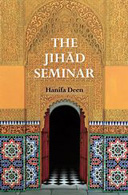 | Hanifa Deen THE JIHAD SEMINAR University of Western Australia Press, 271 pp. Source: review copy Review by Michael Freedman |
Human nature is a strange thing. Who we are as individuals is partly defined by our differences from each other, but it is those differences that are the biggest cause of conflict in our lives. This is particularly so of racial and religious differences, which have been the catalyst for individual and global conflict since the dawn of time. By attempting to examine these differences within a legal trial framework, The Jihad Seminar is thus an important book, but, by its end, the obvious and depressing conclusion is that after thousands of years of war and death blamed on disparities of ideology and physical appearance, the greatest lesson we are taught is that history is constantly repeated.
The Jihad Seminar chronicles a protracted legal battle fought in the Victorian Civil and Administrative Tribunal (VCAT) in 2003, following multiple, unsuccessful attempts at mediation between the parties. The protagonists were the Islamic Council of Victoria (ICV) and Christian organisation Catch the Fire Ministries (CTF), not the first time in history Muslim and Christian groups have been at loggerheads. Yet, while the conflict did not exactly capture the minds of the nation, some pretty important principles were at stake. Ms Deen considers these principles at some length, but this is only part of the story -- this tale is also about a legal system coming dangerously close to spiralling out of control. What was supposed to be a VCAT hearing of only three days, took closer to two years to finally complete. Then came the inevitable appeals, and finally a stalemate in 2007, described euphemistically by Ms Deen as an "out-of-court agreement".
To discover how we got to this sorry state, we have to go back to January 2002, when the Victorian Parliament, amid some controversy, passed into law the Racial and Religious Tolerance Act. The Act, among other things, prohibits "conduct that incites hatred against, serious contempt for, or revulsion or severe ridicule of" others "on the grounds of religious belief or activity". Fair enough, you might think, but it is these words that became the subject of intense scrutiny just months after they were passed into law. It was on 9 March 2002 that CTF, headed by Pastor Danny Scot, held a seminar entitled "An Insight Into Islam" which was, on any view, somewhat critical of Muslim beliefs. Attending the seminar were three Australian-born Muslims, who reported back to the ICV. In turn, the ICV made a complaint of religious vilification under the Act.
It needs to be stated immediately that Ms Deen is a Muslim, and this meant that she was treated with suspicion by most of the CTF supporters and hangers-on, who refused to speak to her. It is fair to say that the book at times is a little one-sided, but this is more due to the CTF refusal to talk to the author rather than any pre-existing bias on her part. It also probably reflects the intransigent attitudes displayed at times by both sides to this conflict, which no doubt added significantly to both the length and ferocity of the battle. Few ideologies polarise people more readily or more completely than religion.
Overall, Ms Deen does an admirable job of covering a complicated legal hearing from a layman's point of view, and while she does have some fairly caustic things to say about CTF and their organisers, for the most part she stays to the objective side of the line. Issues such as religious freedom, free speech, and right not to be vilified, along with prolonged legal action that is not really fully understood by anyone participating in it, including the lawyers and appellate judges, combined to make Ms Deen's task a less than enviable one. Nonetheless the book remains at all times interesting, and her commentary is never condescending.
